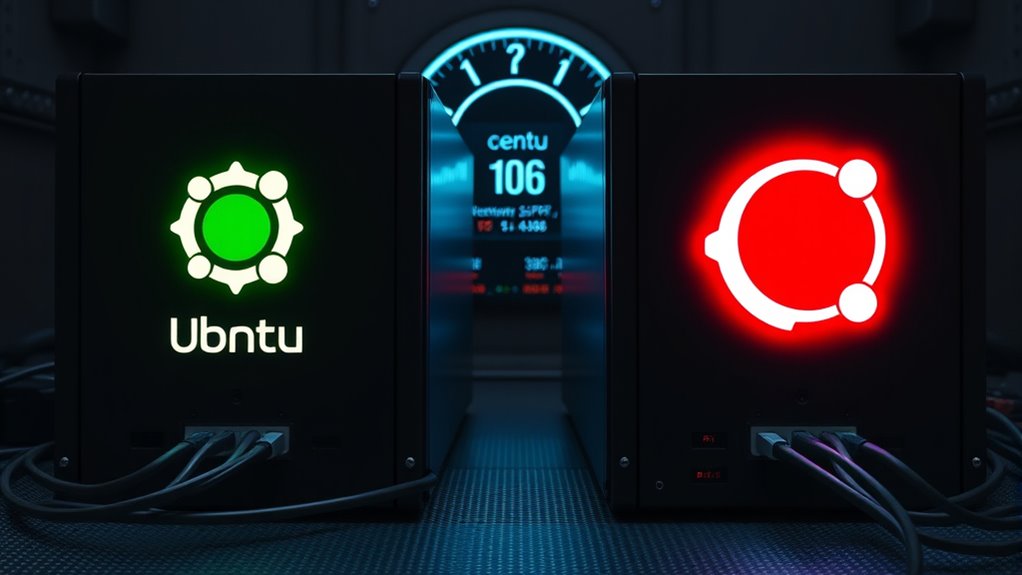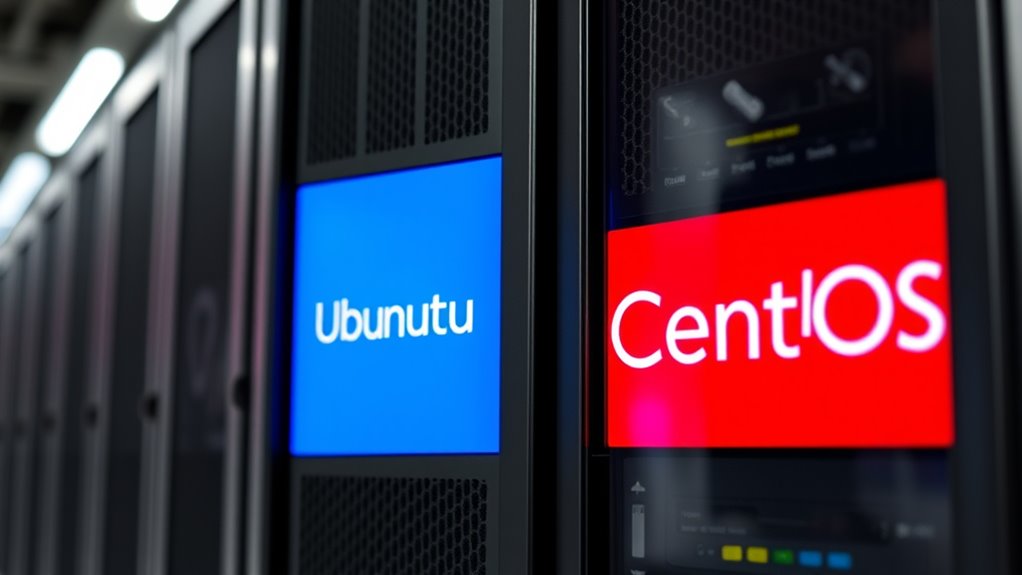If you need a VPS that handles pressure well, Ubuntu might be your best bet thanks to its active community, frequent updates, and user-friendly package management. It’s ideal for deploying new applications quickly and troubleshooting efficiently. CentOS, however, offers exceptional stability and security for long-term enterprise use, making it more resilient under consistent loads. To understand which distribution suits your specific needs and how their strengths compare, keep exploring the details behind their core differences.
Key Takeaways
- Ubuntu offers frequent updates with the latest software, enabling quick adaptation under pressure, while CentOS prioritizes stability with slower, tested updates.
- CentOS’s enterprise-grade stability makes it more reliable for high-pressure environments needing long-term uptime.
- Ubuntu’s active community and extensive resources facilitate rapid troubleshooting during critical situations.
- CentOS’s focus on security and stability ensures consistent performance during stress tests.
- Ubuntu’s user-friendly package management allows faster software deployment and recovery in pressure scenarios.

When choosing a Linux distribution for your VPS, Ubuntu and CentOS are two of the most popular options, each with its own strengths. One key factor to evaluate is package management, which determines how easily you can install, update, and manage software. Ubuntu uses APT (Advanced Package Tool), a straightforward and user-friendly package manager that simplifies software handling, especially for newcomers. Its repositories are vast, providing access to a wide array of packages, often with the latest versions, making it easier to deploy new applications quickly. CentOS, on the other hand, employs YUM (Yellowdog Updater, Modified) and now DNF in newer releases, which are robust and stable package managers rooted in the RPM (Red Hat Package Manager) ecosystem. While RPM-based, CentOS’s package management tends to favor stability over the latest software versions, which is beneficial for production environments requiring consistency and reliability.
Community support plays a vital role when you’re troubleshooting or seeking guidance. Ubuntu boasts a massive, active community with extensive documentation, forums, and tutorials. This means you’re more likely to find solutions to common issues quickly, and there’s a wealth of resources tailored for both beginners and advanced users. Its popularity ensures that many third-party tools and scripts are designed with Ubuntu in mind, smoothing integration and deployment. CentOS also has a dedicated community, especially among enterprise users and system administrators familiar with Red Hat Enterprise Linux (RHEL). While its community might be smaller compared to Ubuntu’s, it’s highly focused on stability, security, and enterprise-grade support. Many users turn to CentOS for its long-term support and reliability, often relying on official documentation and forums that cater to more experienced administrators.
Both distributions excel in community support, but their focus differs. Ubuntu’s larger, more diverse community makes it easier for beginners to find help and resources. Conversely, CentOS’s community is more specialized, often appealing to professionals who prioritize stability and security over bleeding-edge features. When choosing between them, consider how comfortable you are with managing software and troubleshooting. If you prefer a distribution with a vast array of up-to-date packages and user-friendly support, Ubuntu is a great choice. If your priority is a server operating system with proven stability and enterprise-level support channels, CentOS serves that purpose well. Ultimately, your decision should align with your technical needs and comfort level, but understanding these core differences in package management and community support will guide you toward the best fit.
Frequently Asked Questions
How Do Security Updates Differ Between Ubuntu and Centos?
When it comes to security updates, you’ll notice that Ubuntu has a faster security patch frequency, often releasing updates within days of vulnerabilities being identified. CentOS, on the other hand, follows a more conservative update management process, prioritizing stability over speed. This means Ubuntu keeps you more protected with quicker patches, while CentOS offers a more controlled, less disruptive update cycle, suitable for environments where stability is key.
Which Distro Offers Better Support for Containerization Tools?
You’ll find that Ubuntu offers better support for containerization tools, especially with its strong integration for container orchestration platforms like Kubernetes and Docker. Its package management system, APT, makes it easy to install and update container-related packages quickly. CentOS also supports containerization, but Ubuntu’s more frequent updates and extensive repositories give you a smoother experience when managing containers and orchestrating your deployment.
Can Both Ubuntu and Centos Handle High-Traffic Websites Effectively?
Think of your server as a race car—both Ubuntu and CentOS can handle high-traffic websites if tuned right. You’ll want to contemplate scalability challenges and performance benchmarks. Ubuntu’s user-friendly design often makes scaling smoother, while CentOS’s stability makes it reliable under pressure. With proper optimization, both distros can manage traffic surges effectively, but your choice depends on your specific needs for performance and ease of scaling.
What Are the Licensing Costs Associated With Each Distribution?
When comparing the licensing fees and cost structure, you’ll find that Ubuntu is free to use, with optional paid support options, making it budget-friendly for many users. CentOS, on the other hand, is also free, with no licensing fees, but it’s now shifting to CentOS Stream, which may impact stability. Overall, both distributions offer cost-effective solutions, but consider your support needs and future updates when choosing.
How Do Community and Professional Support Options Compare?
Imagine facing a critical server issue—who do you turn to? Ubuntu offers vibrant community forums filled with active users, plus professional support options that can be quickly accessed if needed. CentOS’s support relies heavily on its community, with fewer formal channels. Your choice depends on how much support you want—urgent and reliable, or community-driven and collaborative. The stakes are high, so consider which support setup matches your needs best.
Conclusion
Ultimately, choosing between Ubuntu and CentOS is like selecting a trusted captain for your voyage. Ubuntu, with its vibrant energy, guides you swiftly through modern waters, while CentOS stands as a steady lighthouse, steadfast against storms. Your decision hinges on whether you seek speed and innovation or reliability and resilience. Both serve as your compass—each symbolizing a different strength—ensuring your VPS journey remains smooth, no matter how turbulent the seas.









